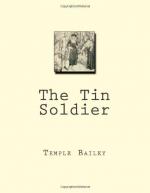The rich man upstairs was—old—.
CHAPTER XX
THE VISION OF BRAVE WOMEN
And now the Tin Soldier was to go to the wars!
Derry, swinging downtown, found himself gazing squarely into the eyes of the khaki-clad men whom he met. He was one of them at last!
He was on his way to meet Jean. The day before they had gone to church together. They had heard burning words from a fearless pulpit. The old man who had preached had set no limits on his patriotism. The cause of the Allies was the cause of humanity, the cause of humanity was the cause of Christ. He would have had the marching hymn of the Americans “Onward, Christian Soldiers.” His Master was not a shrinking idealist, but a prophet unafraid. “Woe unto thee, Chorazin! Woe unto thee, Bethsaida! . . . It shall be more tolerable for Tyre and Sidon in the day of Judgment than for you. And thou, Capernaum, which art exalted unto Heaven, shall be brought down to hell . . .”
“I am too old to go myself,” the old man had said, “but I have sent my sons. In the face of the world’s need, no man has a right to hold another back. Personal considerations which might once have seemed sufficient must now be set aside. Things are at stake which involve not only the honor of a nation but the honor of the individual. To call a man a coward in the old days was to challenge his physical courage. To know him as a slacker in these modern times is to doubt the quality of his mind and spirit. ‘I pray thee have me excused’ is the word of one lost to the high meanings of justice—of love and loyalty and liberty—”
Stirring words. The lovers had thrilled to them. Derry’s hand had gone out to Jean and her own hand clasped it. Together they saw the vision of his going forth, a shining knight, girded for the battle by a beloved woman—saw it through the glamour of high hopes and youthful ardor!
A troop of cavalry on the Avenue! Jackies in saucer caps, infantry, artillery, aviation! Blue and red and green cords about wide-brimmed hats. Husky young Westerners, slim young Southerners, square-chinned young Northerners—a great brotherhood, their faces set one way—and he was to share their hardships, to be cold and hungry with the best of them, wet and dirty with the worst. It would be a sort of glorified penance for his delay in doing the thing which too long he had left undone.
He was to have lunch with Jean in the House restaurant—he was a little early, and as he loitered through the Capitol grounds, in his ears there was the echo of fairy trumpets—“trutter-a-trutt, trutter-a-trutt—”




